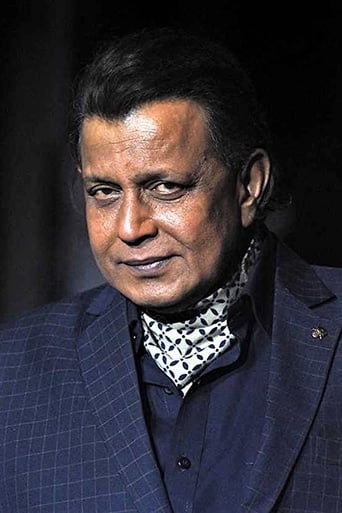Wordiezett
So much average
Robert Joyner
The plot isn't so bad, but the pace of storytelling is too slow which makes people bored. Certain moments are so obvious and unnecessary for the main plot. I would've fast-forwarded those moments if it was an online streaming. The ending looks like implying a sequel, not sure if this movie will get one
Staci Frederick
Blistering performances.
mokono
Still "getting into" Indian movies, so still not conformed to the excessive length and unbalanced focus into beautiful scenery and dramatic scenes to the loss of actual content.Still. The main story line is exactly its synopsis: a guy from a village manages to make the biggest firm in India, polyesters (and maybe something else, but it's irrelevant, he could be dealing in dirt as far as we know).His obstacles are usually dramatic old men giving him an opportunity to not "get bigger" or succeed in any other way, and he always makes it through simply by not accepting "no", and eventually things go his way, without any explanation or illustration.One of deepest comments one overhears here is when he decides to invest in polyester instead of cotton, instead of everything else. So he grabs opportunities that no one else sees. Good job.Also, his whole career is based on him being "Guru", or basically the stubborn brat who only knows to say he doesn't understand "no", that he comes from a village and that he wants to win. So there's a plot twist there, he enters the market with a partner, but being himself, ignores him until he can't be ignored anymore and just quits on his own. Later on, he starts a media campaign exposing the company's faults as revenge (I think, maybe different characters).This is actually the turning point. His father-in-law and ? decide to go against him because he used illegal methods to gain his competitive position. Their several generic dialogues were very *endearing* as the family split and played childish games in order to deliver the most dramatic "i'm gonna fight you until I win" monologue.Ah, yes, that's one of the major faults of the "dialogue", there's no discussion. Either it's a plain monologue, or it's a character accusing another who stays silent and makes dramatic eye contact until the end.To illustrate the best example, the plot twists somewhere here, as apparently the company did do a lot of illegalities, mainly avoiding tax (import and otherwise), manipulation of own share price and other things, which, in my humble opinion, whatever way you spin it, is wrong and bad for society as whole. (There's also a lot of bribing, but I can understand that much better.)So Guru-bai receives all these accusations, first from the only newspaper he couldn't buy, then from the actual government. So what is his answer? "I'm a poor man from a village and I managed to rise. You don't want me to, so you complain about all these things I did. I don't care because I did it for the common man, because I am the common man." So they give up on most of the accusations and he goes on doing his stuff. Great job, really. Brilliant. Couldn't ask for a more generic representation of business than this.Another classic, yet terrible, addition to the movie is the random addition of emotional scenes that actually are too artificial to spark any emotion. So besides the usual father who doesn't approve, there's the sister of the wife who always loves Guru and goes on to live a miserable life in a wheelchair (just to make Guru's enemy marry her out of pity or so) and then die when the action needed some spicing. Guru himself gets half his body paralyzed at the end, just to make his accusers seem even more evil. And all the love bits with Ash seemed fairly random. But I guess I enjoyed them more than the main story, so I'll avoid any comments.What I enjoyed most about the movie? Istanbul, definitely. The "turkish" dancer especially... But more seriously, the movie was very beautiful. Fake, but beautiful. "Enhanced reality", in Istanbul, the countryside and Bombay scenes were great to watch.But really, I want to watch a movie from India that respects its viewers, its content and topics.. and still be astoundingly beautiful and musical.I'm sure there has to be one out there...
venkat1926
Versions-Hindi, Tamil and Telugu . IN DVDs subtitles may be available Actors: Abhishek Bachan, Iswarya Rai, Madhavan, Vidya Balan and Mithun Chakrvarthy.Direction: Maniratnam.Maniratanam is always fascinated by morally ambiguous characters and such morally ambiguous characters are the main protagonists in some of his films. His Thalapathi is of a mafia pair. Nayakan is on Bombay slum don. Guru is on robber baron. The screen play is excellent and the production values are of international standard. The photography is a delight to see and the music by Rahman was as usual full of rhythm. The first song “Nannari” by the female protagonist is much better than “Jodi” song later. Iswarya Rai – herself and her dancing are feasts to the eye. Bachan runs through the role competently. The cameo roles of Madhavan, vidya Balan and Mithun chkravarthy are powerful.----SPOILERS HERE I have a quarrel with the denouement. Guru was hauled up before a commission based on the exposure by the newspaper baron (Mithun) and his journalist (Madhavan). Guru gives a reply to the inquiry in spite of his stroke; what you can derogatorily call “Bashan”. He starts “another man broke the law years back but I am not a Mahatma”. He has the audacity to compare himself with Gandhi. Gandhi broke the laws which he perceived unjust to the Indians not surreptitiously but openly giving notice to the government, Gandhi did not use either strong arm or soft arm tactics on the officers to get his way. Guru also gives a populist reason that earlier in his life getting rich has been only for rich people and the establishment is jealous that an ordinary middle class man tries to become rich. He also spouts the highly populist view of third world corporations beating the first world corporations. At the beginning of the inquiry Guru’s wife who speaks for Guru requests the commission chairman to talk in Tamil (I saw the Tamil version of the film) as she and her husband are village people and do not know much English. What hypocrisy? Ultimately the inquiry commission sets him free with a fine of only 63 lakhs. In the final scene Guru claims that his empire belongs to the shareholders who also became rich in the process and his business has become the top in India and will also become a top class organization in the World.This is all usual libertarian crap from the mouth of a corrupt businessman. This film gives wrong message to the youth. It is OK to break the laws as long as you are successful. At least in Nayakan there is a suspicion of some remorse. At the end of the film Nayakan, his grandchild asks him “are you a good man or a bad man”. Nayakan replies “I do not know”. Guru succeeded during the environment of License Raj. Then the government (read high level officers) had hand in all matters and it is therefore necessary and easier to corrupt morally weak officers. Because of this also Guru did not face any competition. . But once liberalization started and competition increased I don’t think if Guru has now started his business with his morally ambiguous views, he would have survived. It is during this liberal period great organizations like Infosys, TCS, Wipro, Satyam Bajaj Auto, TVS etc came up fast with perhaps minimum shenanigans.GURU is an excellent film with a wrong pernicious message.----spoilers end
Roland E. Zwick
Despite its exotic setting and occasionally flashy technique, "Guru" is really just the oldie about the rube from the provinces who ventures to the Big Bad City in search of fame and fortune, only to fall under the spell of greed and corruption in his ruthless climb to the top. The twist here, though, is that the film is also a nationalistic David-and-Goliath tale of a man from the lower classes who takes on the entrenched corporate interests who use their collective power to keep men like him from sharing in the wealth. This leads to the rather bizarre, ethically dubious contention that it's okay to engage in corruption just as long as the people you are ripping off are demonstrably more corrupt than you are.Ambitious in theme and epic in scope, the story spans a thirty year period, beginning in 1951 when Gurubhai Desai (Abhishek Bachchan) leaves his village to make a success of himself in the outside world, and ending in 1980 when he and his company are facing prosecution for fraud, tax evasion and a whole host of other unscrupulous business practices that are threatening to bring Desai's corporate empire crashing down around him.Despite their undeniable virtues in other areas, Indian films are not generally noted for either their brevity or their emotional subtlety - and "Guru" is no exception in this regard. It suffers from an exhausting 155-minute running time as well as from a tendency to overstate its major plot and character points ad absurdum. When the people in the film are happy, they must be shown to be deliriously happy, dancing in the streets and throwing each other into the air to demonstrate their joy; when they are sad, angry, conniving or morally righteous, they behave in similarly emphatic and underlined ways, with A.R. Rahman's pumped-up, ear-pounding musical score wringing every remaining drop of subtlety and restraint out of the picture.Still, I suppose this is all part of the Bollywood appeal, and there are certainly some notable virtues that make the film worth recommending. First of all, the film is visually stunning, with one beautifully framed image after another unfolding in multi-colored, kaleidoscopic splendor before us. Second, there is a certain old-fashioned freshness to the utterly unabashed and shameless way in which the movie traffics in purple prose melodrama, wearing its emotions so transparently on its sleeves that it purges the story of all possible archness or coyness. (Think of it as a Douglas Sirk production with saris). Finally, as with virtually all commercial Indian films, "Guru" is decked out with a generous helping of lively, though admittedly quite corny, song-and-dance numbers that wind up "stopping the show" in both the best and worst senses of that phrase. For fun as these musical sequences are to watch, they do lead one to wonder if all the money that Indian producers so generously lavish on choreographers might not, in fact, be more wisely spent on a few judicious editors instead.
springsunnywinter
The story was not very interesting but the film itself was so slow and dull that I felt like I could complete a world tour and still be left with incomplete Guru. I rented the movie on a 3 day hire and I couldn't watch all of it at once. I've seen 1 hour on the first day, the second hour on the second day and the final half an hour on the third day so basically it took me 3 days to watch an 2 and a half hour movie phew! It should have been cut down to 30 minutes but it still would have been long. Personally I don't mind how long a film is, as long if it's watch able e.g. Salaam-e-Ishq was 3.5 hours and I seen the whole movie in one go and I really liked it. I just don't know how the audience managed to watch all of it in the cinema hall and it is the filmmaker's luck that Guru is a hit. The only good scene is Mallika Sherawat's cameo and the songs are also good but they didn't make the film any better so my advice would be to watch up to the song Maya Maya. Overall I think that Guru is specifically made for old people and youngsters should avoid it.





